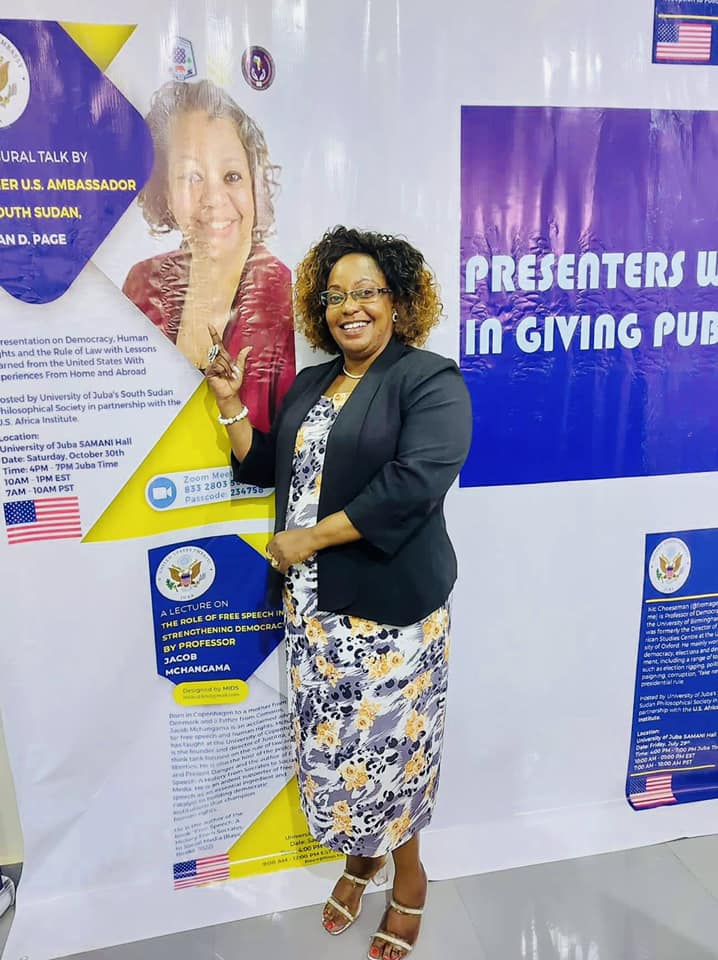The National Transformational Leadership Institute (NTLI) of the University of Juba has launched a book that documented the experiences of women in South Sudan’s peace processes.
The book titled “Women’s Experiences in the South Sudan Peace Process 2013-2018” was launched on March 5 at NTLI, inside the University of Juba Custom campus.
The civil war in South Sudan formally ended on 12 September 2018 with the signing of the Revitalized Agreement on the Resolution of the Conflict in the Republic of South Sudan (R-ARCSS).
South Sudanese women’s groups and representatives played an important role in ensuring an inclusive peace process and a strengthened peace deal, signed in September 2018.
The peace agreement includes key provisions to end the devastating civil war and build sustainable peace in South Sudan.
The book represents insights into the strategies used, achievements, challenges faced, and lessons learned relating to women’s meaningful participation in the South Sudanese peace processes.
The road to a signed peace deal had been long and rocky, spanning over five years from 2013 to 2018.

“To date, insufficient attention has been paid to the significant contribution of South Sudanese women’s groups and representatives to the peace process as a whole,” says Professor Pauline Riak, co-author of the book.
“Not only did they play important roles in ensuring that the process moved forward and that women and other key constituencies were included in the talks, but they also made significant contributions to the content of the peace agreement itself, including gender-specific provisions,” she added.
The book highlights five key strategies used by the women’s groups to influence outcomes of the peace processes in South Sudan.
In particular, they employed advocacy and discrete diplomacy to call for an inclusive peace process. They targeted decision-makers at all levels including leaders of the conflict parties, regional authorities such as IGAD, and international partners.
The women also carried out extensive preparations such as mapping of key decision-makers, to target advocacy, seeking support from technical advisers to depend on the understanding of draft provisions under discussion.
The women groups formed coalitions and developed joint messages alliances regardless of their political lineage.
The book says women leaders strove to ensure that citizens were updated on the peace process, particularly in rural areas. Grassroots consultations and social media groups were used for information-sharing and channeling civic constituencies’ concerns into the negotiations.
When the peace process was at a standstill, women’s groups met key parties to pressure them to keep working on the peace process, says the book.
During the event, women leaders and diplomats used the opportunity to advocate for more inclusion of women in the new unity government.

“As we wait for our cabinet appointment, and our governors’ appointment, we need to stress so much to the decision-makers in this country, the importance of having women in senior positions to bring up other women,” says European Union’s Ambassador to South Sudan, Sinead Walsh.
“I think this whole area of this new phase of governance and the importance of 35 percent, is critical to everyone in this room and the fact that you are here, you feel the same way.”
Meanwhile, the Swedish Ambassador to South Sudan, Hans Henric, stressed the importance of gender equality in achieving peace, security, and social development.

“I will take this opportunity to mention that for the political parties in the transitional process to take advantage, is to make sure that we have women on board in important positions, and to also push for gender balance in the ministries and gender balance in national legislative assemblies and push for gender equality in state level,” ambassador Henric says.
However, Siv Kaspersen, the Norwegian Ambassador to South Sudan, remains cautious.
She says, as women celebrate the years of consistent work and dedication, they are conversant with the difficult tasks ahead.

“The revitalized peace agreement places much emphasis on women’s participation and gender equality. This is very good. And it must be an important opportunity for change for women,” ambassador Kaspersen said.
She revealed that South Sudanese women now expect more women to be included in the government when the cabinet and other officials are appointed.
The Vice-Chancellor of the University of Juba, Professor John Akech, on his part, encouraged the women leaders to continue nourishing the peace process for the new unity government to deliver services to South Sudanese.
He urges civil society, academia, and different interest groups, to make sure that good policies are in place.

“If women want to think that they have contributed to bringing about peace, then we do not have to sleep,” Prof. Akech said.
“For women, I think when a child is born-inform of an agreement that is being implemented, I think there is so much to do to make sure that that child is healthy, that child is educated, instructed, loved and cared for that they grow. This is how we look at it.”
For her part, the Director of NTLI, Dr. Angelina Matijo Bazugba believes given the struggles women underwent during the peace processes, they deserve more leadership positions.

“We are so happy to present the booklet to you so that you can see the struggles that women underwent in this country. But that in itself deserves them to be given not only 35 percent but even beyond and that’s where we position women to a place where we can say women too can make it,” she exclaimed.
The September 2018 revitalized peace agreement tasks the incumbent government to appoint not fewer than six women to ministerial positions; not fewer than three women in SPLM-IO, and SSOA to appoint no less than one woman.
